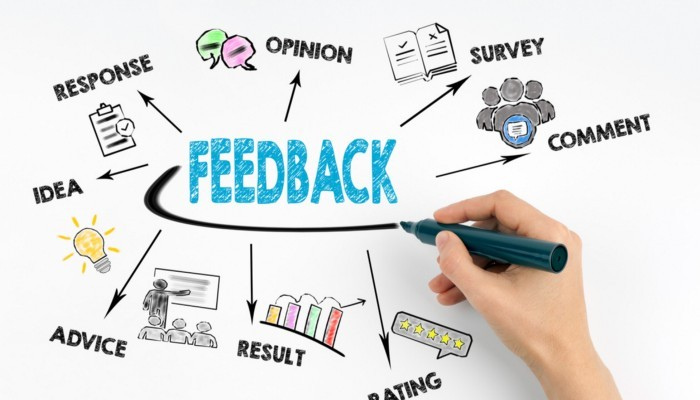Diplomats, or those with the INFJ, INFP, ENFJ, and ENFP personality types, are known for their empathetic and intuitive nature.
They are skilled at understanding the needs and perspectives of others, and at building strong and supportive relationships. When it comes to feedback, Diplomats tend to approach things with a focus on understanding, support, and growth.
One of the key strengths of Diplomats in feedback situations is their ability to understand and empathize with others.

They are skilled at listening carefully to others, and at trying to understand their needs and concerns. This allows them to approach feedback discussions with a sense of compassion and understanding, rather than criticism or judgment.
Diplomats are also skilled at building strong relationships and creating a sense of trust and support.
They tend to be supportive and encouraging of others, and are often willing to offer guidance and help to those in need.
This can be a major advantage when it comes to feedback, as it allows them to create a positive and supportive environment where others feel comfortable and motivated to grow and improve.
Diplomats are also known for their strong communication skills, and are generally skilled at expressing themselves clearly and effectively.
This can be an advantage when it comes to feedback, as it allows them to communicate their needs and concerns in a clear and concise way, and to understand and act upon feedback from others.
One potential challenge for Diplomats in feedback situations is their tendency to be sensitive to criticism or negative feedback.
They may struggle with feeling overly self-conscious or defensive when receiving negative feedback, and may need to work on building their confidence and resilience.
Some additional tips for Diplomats in giving feedback
- Focus on specific behaviors or actions, rather than making personal attacks or criticism.
- Use concrete examples to illustrate your points, rather than relying on generalizations or assumptions.
- Consider the needs and perspectives of the recipient of your feedback, and try to approach the conversation with empathy and understanding.
- Offer support and guidance, rather than just criticism or negative feedback.
- Communicate clearly and directly, and avoid being vague or ambiguous in your feedback.
- Be timely in giving feedback, and try to address issues as soon as possible rather than letting them fester or become larger problems.
- Follow up and check in with the recipient of your feedback to see how they are doing and to offer support and guidance as needed.
- Be open to hearing and considering different perspectives and viewpoints, and try to be flexible and adaptable in your approach to feedback.
- Practice active listening and try to fully understand the perspective of the recipient before giving your feedback.
- Remember that feedback is a two-way conversation, and be open to hearing and considering the feedback of others as well.
Overall, Diplomats tend to approach feedback with a focus on understanding, support, and growth.
Their strong communication skills, empathy, and ability to build strong relationships make them well-suited to give and receive feedback in a positive and supportive way.
Table of Contents
- 1 Diplomats Advocate (INFJ-A/INTJ-T)
- 2 Mediator (INFP-A/INFP-T)
- 3 Protagonist (ENFJ-A/ENFJ-T)
- 4 Campaigner (ENFP-A/ENFP-T)
- 5 10 ADVANTAGES OF DIPLOMATS IN FEEDBACK ISSUES
- 6 10 DISADVANTAGES OF DIPLOMATS IN FEEDBACK ISSUES
- 7 20 QUESTIONS TO ASK TO DIPLOMATS ABOUT FEEDBACK GIVING
- 8 10 TIPS FOR DIPLOMATS FOR FEEDBACK GIVING
Diplomats Advocate (INFJ-A/INTJ-T)
Advocates, or those with the INFJ (Introverted, Intuitive, Feeling, Judging) and ENFJ (Extraverted, Intuitive, Feeling, Judging) personality types, are known for their empathetic and intuitive nature, as well as their strong communication skills.
They are skilled at understanding the needs and perspectives of others, and at building strong and supportive relationships.

One of the key strengths of Advocates in feedback situations is their ability to understand and empathize with others. They are skilled at listening carefully to others, and at trying to understand their needs and concerns.
This allows them to approach feedback discussions with a sense of compassion and understanding, rather than criticism or judgment.
Advocates are also known for their strong communication skills, and are generally skilled at expressing themselves clearly and effectively.
This can be an advantage when it comes to feedback, as it allows them to communicate their needs and concerns in a clear and concise way, and to understand and act upon feedback from others.
In addition to their strong communication skills, Advocates are also known for their ability to build strong relationships and create a sense of trust and support.
They tend to be supportive and encouraging of others, and are often willing to offer guidance and help to those in need.
This can be a major advantage when it comes to feedback, as it allows them to create a positive and supportive environment where others feel comfortable and motivated to grow and improve.
One potential challenge for Advocates in feedback situations is their tendency to be sensitive to criticism or negative feedback.
They may struggle with feeling overly self-conscious or defensive when receiving negative feedback, and may need to work on building their confidence and resilience.
Here are some additional tips for Advocates in giving feedback
- Focus on specific behaviors or actions, rather than making personal attacks or criticism.
- Use concrete examples to illustrate your points, rather than relying on generalizations or assumptions.
- Consider the needs and perspectives of the recipient of your feedback, and try to approach the conversation with empathy and understanding.
- Offer support and guidance, rather than just criticism or negative feedback.
- Communicate clearly and directly, and avoid being vague or ambiguous in your feedback.
- Be timely in giving feedback, and try to address issues as soon as possible rather than letting them fester or become larger problems.
- Follow up and check in with the recipient of your feedback to see how they are doing and to offer support and guidance as needed.
- Be open to hearing and considering different perspectives and viewpoints, and try to be flexible and adaptable in your approach to feedback.
- Practice active listening and try to fully understand the perspective of the recipient before giving your feedback.
- Remember that feedback is a two-way conversation, and be open to hearing and considering the feedback of others as well.
It’s also important for Advocates to remember to take care of their own needs and feelings when giving feedback.
It can be emotionally draining to constantly focus on the needs and concerns of others, and it’s important to set boundaries and make sure to prioritize self-care.
Advocates may also benefit from seeking out support and guidance from trusted friends, family, or colleagues when giving feedback, in order to help them stay grounded and focused on their goals.
Additionally, Advocates may want to consider using tools and techniques such as mindfulness or journaling to help them manage their emotions and stay centered when giving feedback.
Mediator (INFP-A/INFP-T)
Mediators, or those with the INFP (Introverted, Intuitive, Feeling, Perceiving) and ENFP (Extraverted, Intuitive, Feeling, Perceiving) personality types, are known for their empathetic and intuitive nature, as well as their open-minded and adaptable approach to life.
When it comes to feedback, Mediators tend to approach things with a focus on understanding, support, and growth.
One of the key strengths of Mediators in feedback situations is their ability to understand and empathize with others. They are skilled at listening carefully to others, and at trying to understand their needs and concerns.
This allows them to approach feedback discussions with a sense of compassion and understanding, rather than criticism or judgment.
Mediators are also known for their open-minded and adaptable approach to life, which can be an advantage when it comes to feedback.
They are generally open to hearing and considering different perspectives and viewpoints, and are willing to adapt and change their approach as needed. This can make them more receptive to feedback and open to growth and improvement.
In addition to their empathetic and adaptable nature, Mediators are also known for their strong communication skills.
They are generally skilled at expressing themselves clearly and effectively, and are able to communicate their needs and concerns in a clear and concise way.
This can be an advantage when it comes to feedback, as it allows them to understand and act upon feedback from others.
One potential challenge for Mediators in feedback situations is their tendency to be sensitive to criticism or negative feedback.
They may struggle with feeling overly self-conscious or defensive when receiving negative feedback, and may need to work on building their confidence and resilience
Here are some additional tips for Mediato.rs in giving feedback
- Focus on specific behaviors or actions, rather than making personal attacks or criticism.
- Use concrete examples to illustrate your points, rather than relying on generalizations or assumptions.
- Consider the needs and perspectives of the recipient of your feedback, and try to approach the conversation with empathy and understanding.
- Offer support and guidance, rather than just criticism or negative feedback.
- Communicate clearly and directly, and avoid being vague or ambiguous in your feedback.
- Be timely in giving feedback, and try to address issues as soon as possible rather than letting them fester or become larger problems.
- Follow up and check in with the recipient of your feedback to see how they are doing and to offer support and guidance as needed.
- Be open to hearing and considering different perspectives and viewpoints, and try to be flexible and adaptable in your approach to feedback.
- Practice active listening and try to fully understand the perspective of the recipient before giving your feedback.
- Remember that feedback is a two-way conversation, and be open to hearing and considering the feedback of others as well.
It’s also important for Mediators to remember to take care of their own needs and feelings when giving feedback.
It can be emotionally draining to constantly focus on the needs and concerns of others, and it’s important to set boundaries and make sure to prioritize self-care.

Mediators may also benefit from seeking out support and guidance from trusted friends, family, or colleagues when giving feedback, in order to help them stay grounded and focused on their goals.
Additionally, Mediators may want to consider using tools and techniques such as mindfulness or journaling to help them manage their emotions and stay centered when giving feedback.
Overall, Mediators tend to approach feedback with a focus on understanding, support, and growth.
Their empathetic and adaptable nature, combined with their strong communication skills, make them well-suited to give and receive feedback in a positive and supportive way.
Protagonist (ENFJ-A/ENFJ-T)
Protagonists, or those with the ENFJ (Extraverted, Intuitive, Feeling, Judging) personality type, are known for their empathetic and intuitive nature, as well as their strong communication skills.
They are skilled at understanding the needs and perspectives of others, and at building strong and supportive relationships.
When it comes to feedback, Protagonists tend to approach things with a focus on understanding, support, and growth.
One of the key strengths of Protagonists in feedback situations is their ability to understand and empathize with others. They are skilled at listening carefully to others, and at trying to understand their needs and concerns.
This allows them to approach feedback discussions with a sense of compassion and understanding, rather than criticism or judgment.
Protagonists are also known for their strong communication skills, and are generally skilled at expressing themselves clearly and effectively.
This can be an advantage when it comes to feedback, as it allows them to communicate their needs and concerns in a clear and concise way, and to understand and act upon feedback from others.
In addition to their strong communication skills, Protagonists are also known for their ability to build strong relationships and create a sense of trust and support.
They tend to be supportive and encouraging of others, and are often willing to offer guidance and help to those in need.
This can be a major advantage when it comes to feedback, as it allows them to create a positive and supportive environment where others feel comfortable and motivated to grow and improve.
One potential challenge for Protagonists in feedback situations is their tendency to be sensitive to criticism or negative feedback.
They may struggle with feeling overly self-conscious or defensive when receiving negative feedback, and may need to work on building their confidence and resilience.
Here are some additional tips for Protagonists in giving feedback
- Focus on specific behaviors or actions, rather than making personal attacks or criticism.
- Use concrete examples to illustrate your points, rather than relying on generalizations or assumptions.
- Consider the needs and perspectives of the recipient of your feedback, and try to approach the conversation with empathy and understanding.
- Offer support and guidance, rather than just criticism or negative feedback.
- Communicate clearly and directly, and avoid being vague or ambiguous in your feedback.
- Be timely in giving feedback, and try to address issues as soon as possible rather than letting them fester or become larger problems.
- Follow up and check in with the recipient of your feedback to see how they are doing and to offer support and guidance as needed.
- Be open to hearing and considering different perspectives and viewpoints, and try to be flexible and adaptable in your approach to feedback.
- Practice active listening and try to fully understand the perspective of the recipient before giving your feedback.
- Remember that feedback is a two-way conversation, and be open to hearing and considering the feedback of others as well.
It’s also important for Protagonists to remember to take care of their own needs and feelings when giving feedback.
It can be emotionally draining to constantly focus on the needs and concerns of others, and it’s important to set boundaries and make sure to prioritize self-care.
Protagonists may also benefit from seeking out support and guidance from trusted friends, family, or colleagues when giving feedback, in order to help them stay grounded and focused on their goals.
Additionally, Protagonists may want to consider using tools and techniques such as mindfulness or journaling to help them manage their emotions and stay centered when giving feedback.
Overall, Protagonists tend to approach feedback with a focus on understanding, support, and growth.
Their strong communication skills, empathy, and ability to build strong relationships make them well-suited to give and receive feedback in a positive and supportive way.
Campaigner (ENFP-A/ENFP-T)
Campaigners, or those with the ENFP (Extraverted, Intuitive, Feeling, Perceiving) personality type, are known for their empathetic and intuitive nature, as well as their open-minded and adaptable approach to life. When it comes to feedback, Campaigners tend to approach things with a focus on understanding, support, and growth.
One of the key strengths of Campaigners in feedback situations is their ability to understand and empathize with others.
They are skilled at listening carefully to others, and at trying to understand their needs and concerns. This allows them to approach feedback discussions with a sense of compassion and understanding, rather than criticism or judgment.
Campaigners are also known for their open-minded and adaptable approach to life, which can be an advantage when it comes to feedback.
They are generally open to hearing and considering different perspectives and viewpoints, and are willing to adapt and change their approach as needed. This can make them more receptive to feedback and open to growth and improvement.
In addition to their empathetic and adaptable nature, Campaigners are also known for their strong communication skills.
They are generally skilled at expressing themselves clearly and effectively, and are able to communicate their needs and concerns in a clear and concise way.
This can be an advantage when it comes to feedback, as it allows them to understand and act upon feedback from others.
One potential challenge for Campaigners in feedback situations is their tendency to be sensitive to criticism or negative feedback.
They may struggle with feeling overly self-conscious or defensive when receiving negative feedback, and may need to work on building their confidence and resilience.
Campaigners tend to approach feedback with a focus on understanding, support, and growth. They are skilled at listening carefully to others, and at trying to understand their needs and concerns.
This allows them to approach feedback discussions with a sense of compassion and understanding, rather than criticism or judgment.
They are also known for their open-minded and adaptable approach to life, which can be an advantage when it comes to feedback.
They are generally open to hearing and considering different perspectives and viewpoints, and are willing to adapt and change their approach as needed. This can make them more receptive to feedback and open to growth and improvement.
Campaigners are also known for their strong communication skills, and are generally skilled at expressing themselves clearly and effectively.

This can be an advantage when it comes to feedback, as it allows them to communicate their needs and concerns in a clear and concise way, and to understand and act upon feedback from others.
Their ability to build strong relationships and create a sense of trust and support can also be an advantage when it comes to feedback, as it allows them to create a positive and supportive environment where others feel comfortable and motivated to grow and improve.
However, Campaigners may also face some challenges in feedback situations. They may be sensitive to criticism or negative feedback, and may struggle with feeling overly self-conscious or defensive when receiving negative feedback.
They may need to work on building their confidence and resilience in order to better handle difficult feedback.
In order to be effective at giving feedback, Campaigners should focus on specific behaviors or actions, rather than making personal attacks or criticism.
They should use concrete examples to illustrate their points, and consider the needs and perspectives of the recipient of their feedback. They should also strive to be clear and direct in their communication, and avoid being vague or ambiguous.
Overall, Campaigners tend to approach feedback with a focus on understanding, support, and growth. Their empathetic and adaptable nature, combined with their strong communication skills, make them well-suited to give and receive feedback in a positive and supportive way.
10 ADVANTAGES OF DIPLOMATS IN FEEDBACK ISSUES
- Good listening skills: Diplomats tend to be good listeners, and are skilled at understanding the needs and perspectives of others. This can be an advantage when it comes to feedback, as it allows them to approach discussions with a sense of compassion and understanding, rather than criticism or judgment.
- Empathy: Diplomats are known for their empathetic nature, and are generally skilled at understanding and connecting with others on an emotional level. This can be an advantage when it comes to feedback, as it allows them to better understand the needs and concerns of the recipient of their feedback.
- Strong communication skills: Diplomats are generally skilled at expressing themselves clearly and effectively, and are able to communicate their needs and concerns in a clear and concise way. This can be an advantage when it comes to feedback, as it allows them to understand and act upon feedback from others.
- Ability to build strong relationships: Diplomats are known for their ability to build strong and supportive relationships, and are generally skilled at creating a sense of trust and support. This can be an advantage when it comes to feedback, as it allows them to create a positive and supportive environment where others feel comfortable and motivated to grow and improve.
- Open-minded and adaptable: Diplomats are generally open to hearing and considering different perspectives and viewpoints, and are willing to adapt and change their approach as needed. This can be an advantage when it comes to feedback, as it allows them to be more receptive to feedback and open to growth and improvement.
- Strong problem-solving skills: Diplomats are known for their strong problem-solving skills, and are generally skilled at finding creative and innovative solutions to challenges. This can be an advantage when it comes to feedback, as it allows them to identify and address issues in a proactive and constructive way.
- Ability to see the big picture: Diplomats are known for their ability to see the bigger picture and to consider the broader implications of their actions. This can be an advantage when it comes to feedback, as it allows them to consider the long-term impact of their actions and to make informed and strategic decisions.
- Confidence and leadership skills: Diplomats are generally confident and assertive, and are skilled at taking charge and leading others. This can be an advantage when it comes to feedback, as it allows them to be decisive and to take a proactive approach to addressing issues.
- Positive attitude: Diplomats tend to have a positive and optimistic outlook, and are generally skilled at finding the good in any situation. This can be an advantage when it comes to feedback, as it allows them to approach challenges with a positive and constructive attitude.
- Ability to handle difficult situations: Diplomats are generally skilled at handling difficult situations and conflicts, and are able to remain calm and composed under pressure. This can be an advantage when it comes to feedback, as it allows them to handle difficult feedback or criticism in a professional and constructive way.
10 DISADVANTAGES OF DIPLOMATS IN FEEDBACK ISSUES
- Sensitivity to criticism: Diplomats may be sensitive to criticism or negative feedback, and may struggle with feeling overly self-conscious or defensive when receiving negative feedback.
- Difficulty with confrontation: Diplomats may struggle with confrontation and may have a hard time giving direct or critical feedback to others.
- Tendency to avoid conflict: Diplomats may have a tendency to avoid conflict or difficult situations, and may avoid giving or receiving feedback in order to maintain harmony and avoid confrontation.
- Difficulty with assertiveness: Diplomats may struggle with assertiveness and may have a hard time standing up for themselves or expressing their own needs and concerns.
- Tendency to be too accommodating: Diplomats may have a tendency to be too accommodating and may have a hard time setting boundaries or saying no to others. This can make it difficult for them to give honest and direct feedback.
- Difficulty with decision-making: Diplomats may struggle with decision-making and may have a hard time making clear and decisive choices. This can make it difficult for them to give clear and direct feedback.
- Tendency to be indecisive: Diplomats may have a tendency to be indecisive and may struggle with making firm decisions or taking action. This can make it difficult for them to give clear and direct feedback.
- Tendency to procrastinate: Diplomats may have a tendency to procrastinate and may struggle with meeting deadlines or taking timely action. This can make it difficult for them to give timely and effective feedback.
- Difficulty with structure and routine: Diplomats may struggle with structure and routine, and may have a hard time following established procedures or processes. This can make it difficult for them to give or follow through on feedback in a consistent and structured way.
- Tendency to be disorganized: Diplomats may have a tendency to be disorganized and may struggle with maintaining clear and efficient systems and processes. This can make it difficult for them to give and follow through on feedback in an organized and effective way.
20 QUESTIONS TO ASK TO DIPLOMATS ABOUT FEEDBACK GIVING
- What do you think are your strengths when it comes to giving feedback?
- What do you think are your challenges or weaknesses when it comes to giving feedback?
- How do you typically approach giving feedback to others?
- What methods or techniques do you find most effective when giving feedback?
- How do you handle difficult or negative feedback situations?
- How do you balance the need to be honest and direct with the need to be compassionate and understanding when giving feedback?
- How do you handle criticism or negative feedback from others?
- How do you ensure that your feedback is timely and relevant?
- How do you follow up or check in with others after giving feedback?
- How do you handle conflict or disagreement when giving feedback?
- How do you ensure that your feedback is specific and actionable?
- How do you balance the need to be direct with the need to be sensitive to others’ feelings when giving feedback?
- How do you build trust and support when giving feedback?
- How do you maintain a positive and constructive attitude when giving feedback?
- How do you stay focused and present when giving feedback?
- How do you handle situations where the recipient of your feedback is resistant or uncooperative?
- How do you balance the need to be supportive with the need to be honest and direct when giving feedback?
- How do you handle situations where you are not sure how to give feedback or where you disagree with the recipient of your feedback?
- How do you ensure that your feedback is clear and concise?
- How do you balance the need to give feedback with the need to respect others’ autonomy and independence?

10 TIPS FOR DIPLOMATS FOR FEEDBACK GIVING
- Practice active listening: Diplomats should try to focus on fully understanding the perspective of the recipient of their feedback before giving their own thoughts or opinions.
- Use concrete examples: When giving feedback, Diplomats should try to use specific examples to illustrate their points, rather than relying on generalizations or assumptions.
- Be timely: Diplomats should try to address issues as soon as possible, rather than letting them fester or become larger problems.
- Be specific and actionable: Diplomats should try to focus on specific behaviors or actions, rather than making personal attacks or criticism. They should also aim to give feedback that is clear and actionable, rather than vague or ambiguous.
- Consider the needs and perspectives of the recipient: Diplomats should try to approach feedback conversations with empathy and understanding, and consider the needs and perspectives of the recipient of their feedback.
- Offer support and guidance: Rather than just giving criticism or negative feedback, Diplomats should try to offer support and guidance to help the recipient of their feedback grow and improve.
- Follow up and check in: Diplomats should try to follow up and check in with the recipient of their feedback to see how they are doing and to offer support and guidance as needed.
- Be open to hearing and considering different perspectives: Diplomats should try to be open to hearing and considering different perspectives and viewpoints, and be flexible and adaptable in their approach to feedback.
- Manage your emotions: Diplomats may need to work on building their confidence and resilience in order to better handle difficult feedback. They may also want to consider using tools and techniques such as mindfulness or journaling to help them manage their emotions and stay centered when giving feedback.
- Seek feedback and guidance from others: Diplomats may want to consider seeking out feedback and guidance from others as well, in order to continue learning and growing as individuals.
Any more ideas?
https://psytify.com/personality-types/

https://psytify.com/flirting-styles-mbti-sentinels-2023/
https://psytify.com/famous-people-according-to-their-mbti-type/
https://psytify.com/what-is-mbti/
